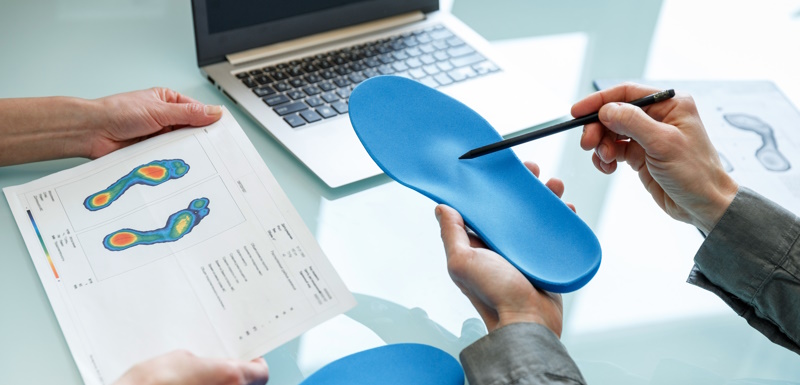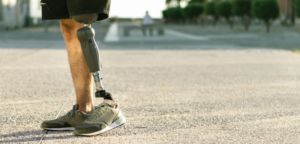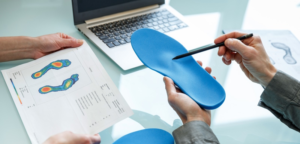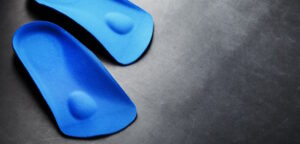Information from a Kansas City Orthotics Clinic You Can Trust
According to recent data shared by HealthInAging.org, approximately 87% of people will experience pain in their feet at some point in their lives. The source of foot pain ranges from wearing shoes that are too small to genetic conditions that put unnatural stress on the foot and ankle regions.
Foot orthotics are a type of shoe insert that are meant to relieve the pain and discomfort associated with a foot-related condition. Most pharmacies and stores with a health supplies section sell over-the-counter orthotics. They are best for those who are experiencing minor foot pain or slightly raised arches.
On the other hand, foot orthotics – also known as prescription or custom orthotics – are intended for those with severe foot or ankle conditions that cause pain and affect their walking gait. After we define what foot orthotics are, we will break down the main conditions that require them and where to find custom orthotics in Kansas City.
What Are Foot Orthotics?
Foot orthotics are generally prescribed by a podiatrist and custom made by an orthotics specialist. Whereas over-the-counter orthotics offer an approximation of a good fit, advanced orthotics precisely fit the contours of the wearer’s feet. Foot orthotics fall into one of two categories: functional orthotics and accommodative orthotics.
Functional orthotics correct an abnormal walking motion and decrease pain. They are typically made from plastic, graphite, or other rigid material. By comparison, the goal of accommodative orthotics is to provide the wearer with comfort, which means that they are generally made from softer materials that offer cushion.
The type of foot orthotics that a patient needs is primarily determined by their condition or symptoms. Once diagnosed, your podiatrist will prescribe advanced orthotics that offer the most positive healthcare outcome.
What Types of Medical Conditions Require Advanced Orthotics?
Foot orthotics can improve the symptoms of many conditions. Some of them are genetic, while others may develop later in life due to disease, injury, or from years of wearing improper shoes. The main conditions include:
- Overpronation or supination: Pronation refers to an excessive inward rolling of the foot when it bears weight as you take a step. Supination is the opposite – your foot rolls excessively to the outside when you bear weight. Advanced orthotics have proven successful in correcting these specific issues and the pain associated with them, helping wearers achieve a neutral step in which weight is evenly distributed throughout the foot.
- Bursitis: This is a condition that is most common in elbows, shoulders, and hips. Bursitis occurs when small sacs of fluid in the joints are inflamed, which can make movement and bearing weight painful or difficult. The good news is that bursitis will go away on its own with rest, ice, and other basic treatments. Chronic sufferers of bursitis in the hips should contact a Kansas City orthotics clinic.
- Bunions: Roughly one out of every three people suffers from bunions, which makes it one of the most common foot conditions Americans face. A bunion is a bony bump on the joint at the base of your big toe. It develops when some of the bones shift out of place, causing the tip of your big toe to pull toward your smaller toes. Bunionettes form in a similar way on the joint of your pinky toe. This condition makes it difficult to find shoes that fit. However, advanced orthotics can help relieve the painful symptoms of bunions.
- Flat feet: Statistically, approximately 8% of Americans are born with flat feet. Although some people with flat feet experience no negative symptoms, many rely on advanced orthotics to alleviate pain.
- Plantar fasciitis: Most common in runners and people who are overweight, plantar fasciitis occurs when the plantar fascia tissue in the bottom of the foot is inflamed. The inflammation results in intense, stabbing heel pain that’s usually at its worst upon first waking up in the morning. Foot orthotics have proven effective in relieving these symptoms.
- Rheumatoid arthritis: This autoimmune condition can cause deformity, swelling, and intense pain in any joint in the body – including the ankles, feet, and knees. Because there is no cure for rheumatoid arthritis, the point of advanced orthotics is to mitigate pain and discomfort as much as possible.
- Diabetic neuropathy: This condition impacts those who are afflicted with diabetes. Uncontrolled high blood sugar damages the nerves, usually in the feet, making it painful to walk. Advanced orthotics in combination with prescription medication can relieve the symptoms.
Searching for a Kansas City Orthotics Clinic? Contact Us Today!
Now that you know what advanced orthotics are and the conditions that require them, your next step is to find a clinic that specializes in orthotics and prosthetics near you. Fortunately, Cotton Orthotic & Prosthetic Associates works with a wide variety of patients who have conditions that require orthotic solutions.
The best way to get started is by contacting our team to book your initial consultation. Once we have a better idea of what orthotic solution your condition requires, we can get to work on customizing it to your exact foot shape so you can walk pain-free again. Use the contact form on our website or call (913) 338-2672 to speak with our scheduling department.







